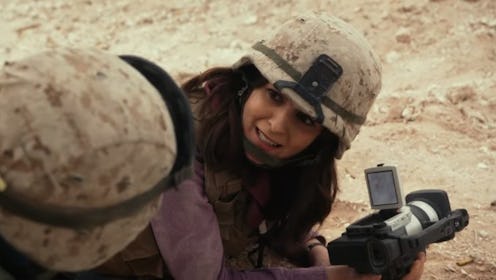
There are several moments in Whiskey Tango Foxtrot, Tina Fey’s latest dramedy about real journalist Kim Barker’s experiences in Afghanistan, when it looks like Fey’s determined reporter is going to be judged or insulted for being a woman reporting in a war zone. Often throughout the film, it seems that doubt from Kim's fellow reporters, the gruff general she deals with, or any of the male soldiers she encounters, might manifest in some sexist comment about how she shouldn't be there. And yet, shockingly, it never happens. Despite being a story centered on a woman in a typically man’s world, Whiskey Tango Foxtrot avoids the serious cliches and tired sexism that a lesser film would stoop to in order to create conflict — and it's a much better, and more feminist, movie because of it.
The plot at the heart of the movie is deceptively simple: Fey’s character leaves a dead-end job and a lackluster boyfriend behind to head to Afghanistan during the early 2000s in order to report on the ongoing war. Yet while initially, Whiskey might seem to be a simple "fish out of water" story, the film has more originality than the trailer gives it credit for. That signature Robert Carlock/Tina Fey brand of comedy is there, for sure, but themes of professional drive, loyalty, culture clash, and international relations make the film not even close to your typical "woman-leaves-her-job-to-find-herself" story. Especially because the movie never raises the question of whether or not Baker can do her job because she’s a woman.
Maybe I’ve seen too many movies about women trying to succeed in traditionally "male" professions. Maybe I’ve had too many male colleagues make their doubts about my abilities known to me in my own journalistic career. But before sitting down to watch Whiskey Tango Foxtrot, I half expected most of Kim's challenges to be the result of her gender, because as any woman in a male dominated profession can tell you, it can be hell out there — newsrooms and journalism in general aren’t exactly bastions of equality. But when Kim arrives in Kabul and is greeted by fellow female reporter Tanya (Margot Robbie), who gleefully celebrates the fact that there’s another woman in the house, their camaraderie doesn’t grow out of a shared feeling of oppression, because it simply doesn't exist. Really, none of the main conflict in the film arises out of Kim’s gender; there’s enough inherent drama in reporting from a war zone to begin with.
When Kim has to pee while on the road and the entire brigade of Marine SUVs have to stop in the middle of the desert, with multiple armed lookouts put in place just to she can take a leak, the only comments from the soldiers are about her newness to the field, not her gender. There are no snarky comments about how inconvenient it is to have a woman on their mission, or how much easier it would have been if they had been given a reporter who could, among other things, pee standing up. It's a wonderful surprise, and it sets the tone for the rest of the movie in a truly great way.
Allowing Kim’s gender in relation to her job to go unremarked upon in Whiskey Tango Foxtrot, other than when necessary, is a refreshing change for this genre of film. While it can be great when movies point the microscope at the sexism women face in specific careers or discuss how they can overpower adversity, it’s also nice to occasionally see a film that doesn’t have that on its docket. It frees up Whiskey Tango Foxtrot to explore things unrelated to gender — in particular, how the so-called "journalism rush" can lead to altered perceptions of reality, as reporters dig deeper and deeper for that scoop and the high that comes as a result.
That said, there are a couple of times in the movie that Kim's gender does come into play. At one point in the film, Kim’s womanhood actually becomes essential to a mission, when a group of burqa-wearing women reveal to her a secret she then relays to the soldiers. These women would never have been able to speak to any of the men, but they're able, and willing, to speak to Kim. And yes, minor instances of sexism also come into play throughout the movie. One of General Hollanek’s (Billy Bob Thornton) first comments to Kim is a request that she not sleep with any of his soldiers, yet he doesn't ask the same of his soldiers. Then there's the plotline involving Alfred Molina’s character, a politician named Ali Massoud Sadiq, who later becomes Prime Minister of the country. Without giving too much away, their reporter-subject relationship is challenged by his continued inappropriate behavior towards Kim.
But neither of these instances become major issues, and their inclusion in the film doesn’t negate the fact that Whiskey is primarily focused on a reporter's triumphs and challenges in Afghanistan. For once, it's great to be able to see a movie about a woman doing a kickass job at her career without talk of "leaning in" or "having it all." True equality means that one day, it won’t be a question as to whether or not women can perform certain duties or pursue certain careers, but it will simply be presumed that we can, without discussion. In that sense, Whiskey Tango Foxtrot is wonderfully ahead of the curve.
Images: Paramount